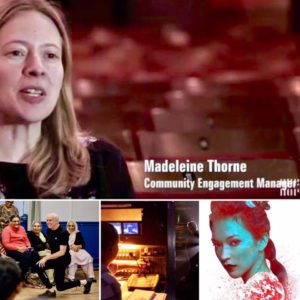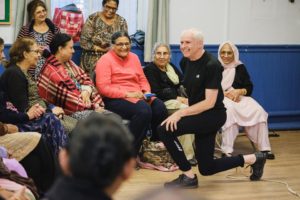
The director of Get the Chance Guy O’Donnell recently met with Madeleine Thorne, Community Engagement Manager, Opera North. Madeleine gives an overview of her career to date and we discuss the Paul Hamlyn Club at Opera North.
Hi Madeleine, can you give our readers some background information on yourself please?
My name is Madeleine Thorne and I am the Community Engagement Manager at Opera North. I have been working for Opera North for the last 3.5 years – although I did take 9 months off last year to have a baby!
So what got you interested in the arts ?
I was very lucky that my mother is very keen on theatre and so took me to see all sorts of different performances from a very young age. I have therefore wanted to have a career in the performing arts for as long as I can remember – originally I wanted to be an actor but whilst at university I did a project in a school and gradually came to realise that there is nothing more satisfying than introducing people to the magic of the performing arts!
You coordinate the Paul Hamlyn Club at Opera North. Can you please tell us more about this initiative and your role?
Opera North is fortunate to be one of the five venues in the UK that the Paul Hamlyn Foundation (PHF) approached with regards to setting up a Paul Hamlyn Club in order to encourage people who would normally have barriers to engaging with us to come and see our work. I was hired to shape and deliver the project – my job includes strategic planning as well as the day-to-day delivery of the work, and as I have a background in directing and workshop facilitation I have also take on a creative role in terms of devising and delivering taster performances and workshops.

Anthony Haddon performing in “An Introduction to… Billy Budd”
Photographer Tom Arber
The Paul Hamlyn Foundation is funding the Paul Hamlyn Clubs to “attract and build relationships with audiences from disadvantaged groups within their local communities.” How has your organisation approached this objective?
We believe in working with community groups and local organisations – they already know the people that we are looking to target, and they help us in terms of promoting our work and co-ordinating trips to see our performances. We also feel that it can be very powerful for people to attend as part of a group, especially when they are anxious about coming, or when they are concerned that there won’t be anyone else “like them” in the audience. Developing meaningful relationships with both groups and individuals is also central to the project – we spend a lot of time going out to meet groups as well as personally greeting them when they come to us for events and performances. It is important for us that everyone feels genuinely welcome and valued.
Have your new audiences prioritised any specific type of work at your venue?
As we work with such a diverse range of groups and communities it is hard to give a generalised answer to this – but I will say that the people with whom we work tend to be much more open-minded than one might have expected! Although we do get larger numbers at our more well-known operas, it is often the lesser-known works that really capture people’s imaginations, especially when we have done some work with them ahead of attending (via our taster performances or workshops) so they are familiar with some of the music, themes, characters or storylines.
What initiatives have you implemented that have proven to support new audiences who face disadvantage?
I think the two key things have been the time we spend developing meaningful relationships with the groups and individuals with whom we work, and the programme of taster performances and workshops which we take out to community settings.
What impact has had this project in your venue had on the larger organisation?
The project has helped expand and diversify our audiences which is obviously very important, but there is also a strong sense of pride that it is enabling us to make a positive contribution to the well-being of our local community too.
In the current funding climate many venues and organisation have very limited budgets. Is it possible to share some of your learning that organisations could implement to support new audiences that doesn’t require large amounts of funding?
Obviously funding is always going to be useful, but I think the most important thing an organisation can do is to commit staff time to this kind of work. Having dedicated staff members, such as myself, who have the capacity to spend a lot of time working in the local community is great, but almost everyone in the organisation can get involved by – for example – helping to welcome new audiences and by bringing their specialist skills, talents and knowledge to taster events. The other obvious thing is to identify shows that are unlikely to sell out and then offer the spare tickets to targeted groups and individuals.
Get the Chance works to support a diverse range of members of the public to access cultural provision In relation to your own project are you aware of any barriers for audiences to access cultural provision.
I think that, again, it varies from community to community. However common barriers which I hear in terms of opera are: the cost of the tickets (or the perceived cost of tickets – people often think they are more expensive than they actually are!), the perceived length of the performances, people thinking that they won’t understand the language, and people thinking that opera is not “for them” and that it is instead for “posh” people. Other barriers might be about transport or childcare, or people might be nervous about coming into the city centre at night. To be honest a lot of the time the people that we work with via the project have never come across opera so it is not a case of them avoiding it, they are simply unaware it is happening!
Finally a more personal question. What excites you about the arts? What was the last really great cultural activity event that you experienced that you would like to share with our readers?
I wholeheartedly believe that the arts have the power to transform lives – and I feel privileged to have witnessed this time and time again throughout my career. Personally I feel that the arts give us both a way to escape from the challenges of everyday life, and a way of understanding the world in which we live, plus they often just have a magical aura which cannot easily be defined! I see so many brilliant performances through my work – Opera North productions are consistently fantastic and we also have some amazing artists performing in our venue, the Howard Assembly Room. However, a recent highlight for me would have to be Mind the Gap’s show “Contained” which I saw at the West Yorkshire Playhouse in March – all the performers had learning disabilities but the production used an inventive mix of filmed footage, projection, movement and monologue to demonstrate that they were all individual people experiencing the ups and downs of everyday life and, as someone who has worked a lot with people with learning disabilities, I found this both powerful and deeply moving.
https://www.operanorth.co.uk/community-engagement
